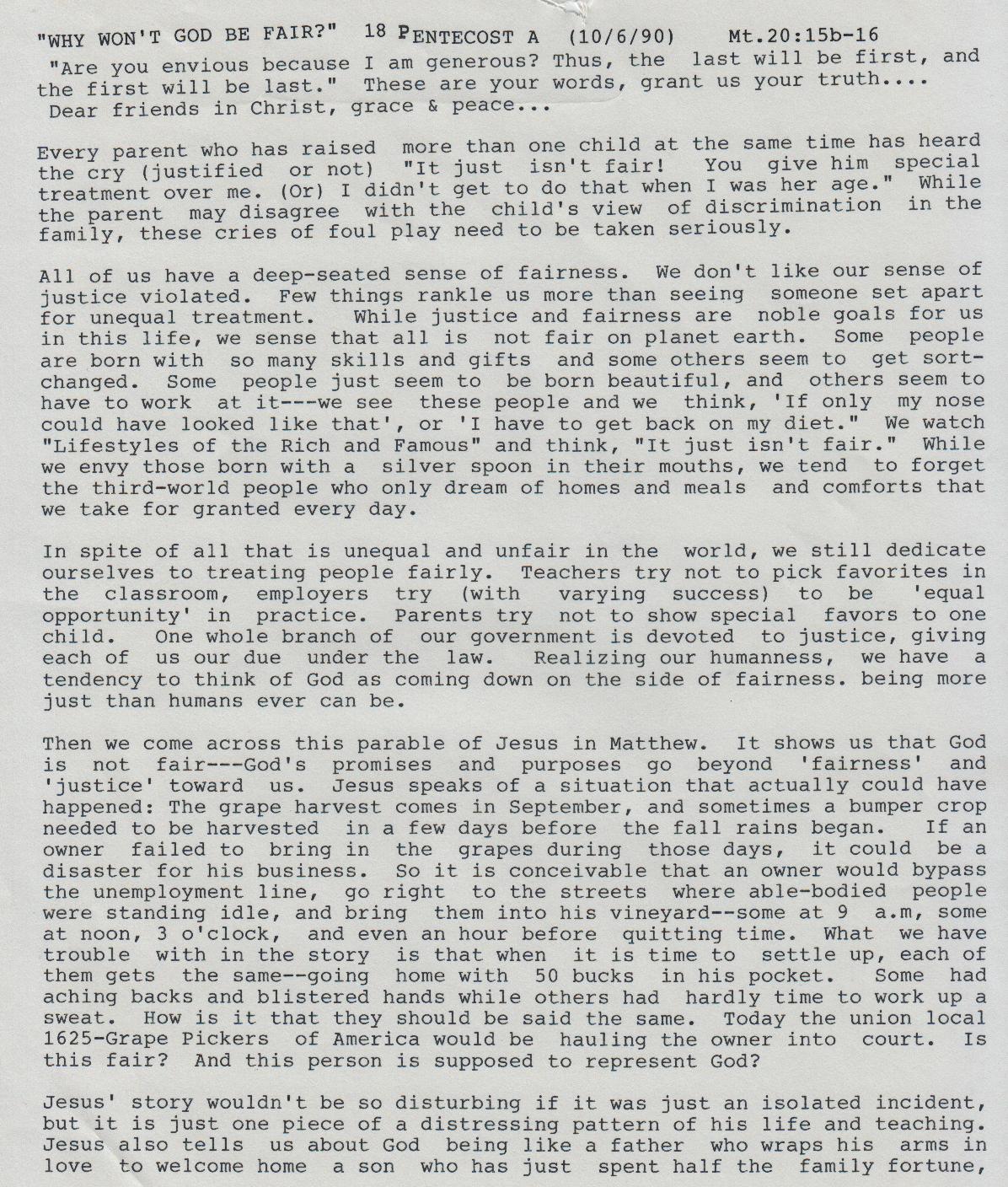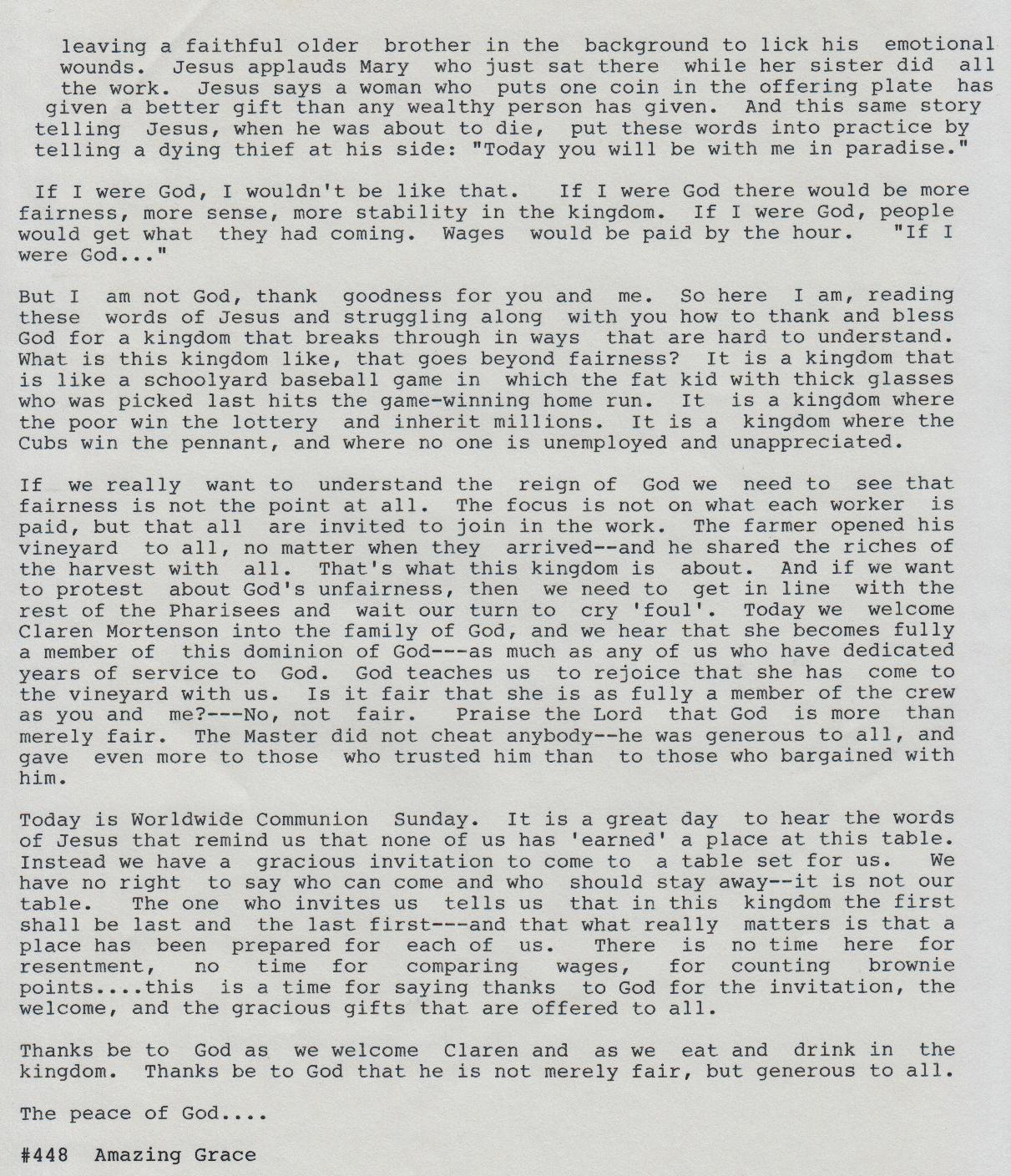Here is a typed sermon from 1990. It references the Cubs winning the pennant as an example of unlikely events. It also mentions the baptism of a child that occurred that day.
There is a reference to Lifestyles of the Rich and Famous in this sermon. The sermon lists the 18th Sunday after Pentecost as the Lectionary, but the gospel that is cited (Matthew 20:1-16) actually comes from the 17th Sunday after Pentecost in Year A. It’s possible that this is because of a change in the Lectionary after this sermon was written. Text of this sermon is available by using OCR from Google Docs.
Why Won’t God Be Fair? - 17 Pent A - 10/6/1990


Every parent who has raised more than one child at the same time has heard the cry (justified or not) “It just isn’t fair! You give him special treatment over me. (Or) I didn’t get to do that when I was her age.” While the parent may disagree with the child’s view of discrimination the parent may disagree with the family, these cries of foul play need to be taken seriously.
All of us have a deep-seated sense of fairness. We don’t like our sense of justice violated. Few things rankle us more than seeing someone set apart for unequal treatment. While justice and fairness are noble goals for us in this life, we sense that all is not fair on planet earth. Some people are born with so many skills and gifts and some others seem to get sort- changed. Some people just seem to be born beautiful, and others seem to have to work at it—we see these people and we think, ‘If only my nose could have looked like that’, or ‘I have to get back on my diet." We watch “Lifestyles of the Rich and Famous” and think, “It just isn’t fair.” While we envy those born with a silver spoon in their mouths, we tend to forget the third-world people who only dream of homes and meals and comforts that we take for granted every day.
In spite of all that is unequal and unfair in the world, we still dedicate ourselves to treating people fairly. Teachers try not to pick favorites in the classroom, employers try (with varying success) to be ’equal opportunity’ in practice. Parents try not to show special favors to one child. One whole branch of our government is devoted to justice, giving each of us our due under the law. Realizing our humanness, we have a tendency to think of God as coming down on the side of fairness. being more just than humans ever can be.
Then we come across this parable of Jesus in Matthew. It shows us that God is not fair—God’s promises and purposes go beyond ‘fairness’ and ‘justice’ toward us. Jesus speaks of a situation that actually could have happened: The grape harvest comes in September, and sometimes a bumper crop needed to be harvested in a few days before the fall rains began. If an owner failed to bring in the grapes during those days, it could be a disaster for his business. So it is conceivable that an owner would bypass the unemployment line, go right to the streets where able-bodied people were standing idle, and bring them into his vineyard–some at 9 a.m, some at noon, 3 o’clock, and even an hour before quitting time. What we have trouble with in the story is that when it is time to settle up, each of them gets the same–going home with 50 bucks in his pocket. Some had aching backs and blistered hands while others had hardly time to work up a sweat. How is it that they should be said the same. Today the union local 1625-Grape Pickers of America would be hauling the owner into court. Is this fair? And this person is supposed to represent God?
Jesus’ story wouldn’t be so disturbing if it was just an isolated incident, but it is just one piece of a distressing pattern of his life and teaching. Jesus also tells us about God being like a father who wraps his arms in love to welcome home a son who has just spent half the family fortune, leaving a faithful older brother in the background to lick his emotional wounds. Jesus applauds Mary who just sat there while her sister did the work. Jesus says a woman who puts one coin in the offering plate has given a better gift than any wealthy person has given. And this same story telling Jesus, when he was about to die, put these words into practice by telling a dying thief at his side: “Today you will be with me in paradise.”
If I were God, I wouldn’t be like that. If I were God there would be more fairness, more sense, more stability in the kingdom. If I were God, people would get what they had coming. Wages would be paid by the hour. “If I were God…”
But I am not God, thank goodness for you and me. So here I am, reading these words of Jesus and struggling along with you how to thank and bless God for a kingdom that breaks through in ways that are hard to understand. What is this kingdom like, that goes beyond fairness? It is a kingdom that is like a schoolyard baseball game in which the fat kid with thick glasses who was picked last hits the game-winning home run. It is a kingdom where the poor win the lottery and inherit millions. It is a kingdom where the Cubs win the pennant, and where no one is unemployed and unappreciated.
If we really want to understand the reign of God we need to see that fairness is not the point at all. The focus is not on what each worker is paid, but that all are invited to join in the work. The farmer opened his vineyard to all, no matter when they arrived–and he shared the riches of the harvest with all. That’s what this kingdom is about. And if we want to protest about God’s unfairness, then Iwe need to get in line with the rest of the Pharisees and wait our turn to cry foul’. Today we welcome Claren Mortenson into the family of God, and we hear that she becomes fully a member of this dominion of God—as much as any of us who have dedicated years of service to God. God teaches us to rejoice that she has come to the vineyard with us. Is it fair that she is as fully a member of the crew as you and me?—No, not fair. Praise the Lord that God is more than merely fair. The Master did not cheat anybody–he was generous to all, and gave even more to those who trusted him than to those who bargained with him.
Today is Worldwide Communion Sunday. It is a great day to hear the words of Jesus that remind us that none of us has ’earned’ a place at this table. Instead we have a gracious invitation to come to a table set for us. We have no right to say who can come and who should stay away–it is not our table. The one who invites us tells us that in this kingdom the first shall be last and the last first—and that what really matters is that a place has been prepared for each of us. There is no time here for resentment, no time for comparing wages, for counting brownie points….this is a time for saying thanks to God for the invitation, the welcome, and the gracious gifts that are offered to all.
Thanks be to God as we welcome Claren and as we eat and drink in the kingdom. Thanks be to God that he is not merely fair, but generous to all.
The peace of God…. #448 Amazing Grace